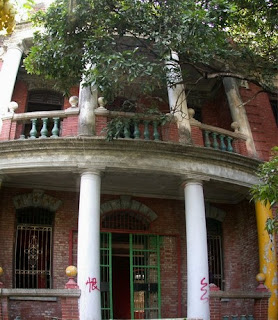 |
| Nam Koo Terrace |
According to many locals in Hong Kong, the pictured mansion is an authentic haunt of spirits. Just looking at the exterior of this old mansion causes the imagination to run wild. While it's true that the Chinese generally tend to lean toward belief in superstition, I have a healthy respect for any place that elevates the myth of urban legend to something more real and terrifying.
Several years ago, a group of young students wanted to stay overnight in that mansion in an attempt to see ghosts they believed haunted the rooms. According to reports published in the local papers, events did not go as planned for the young ghost hunters. At some point in the evening, the students decided they had had enough and wanted to leave. They made their way to the gated entrance when suddenly the girls in the group began growing agitated, became emotionally distressed and appeared to lose control of their own bodies.
Two police officers patrolling Ship Street that evening saw the group and noticed the commotion. The officers investigated, offering their assistance. The reports say that when the officers attempted to restrain the girls, who by now had grown aggressive, the officers required the support of additional officers at the scene. It took the efforts of everyone assembled at the gate of the mansion to physically restrain the female students. The troubled students were finally subdued and sent to a hospital for psychiatric evaluation.
Today, the former Japanese brothel still stands on Ship Street in Wan Chai, desolate, save for the feral cats who call it home, haunted by the spirits of deceased comfort women.
True story?
